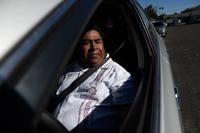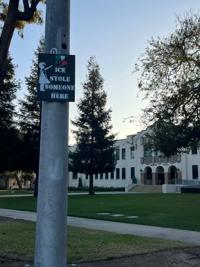This November, California voters will decide on Proposition 35, which is intended to make the existing tax on managed healthcare insurance plans permanent. Half of all Medi-Cal recipients are Latine, making them the most affected ethnic group of the proposed ballot measure.
The measure’s proponents, composed of nearly every major health organization in California, including California Primary Care Association and California Medical Association, say the estimated $35 billion in revenue it would generate would fund primary and specialty care, emergency services, family planning, mental health and prescription drugs. It’s also a push, proponents say, to hold Governor Gavin Newsom to his word in permanently securing tax money for health care in the state.
Opponents, however, argue the proposition deliberately confuses voters with manipulative language and will negatively affect low-income Latines on Medi-Cal in need of better coverage, and that the amount of money proponents have raised for the measure should be a red flag to voters.
Opponents include the League of Women Voters of California, California Pan-Ethnic Health Network, The Children’s Partnership, California Alliance for Retired Americans and Courage California. They criticize the use of “ballot box budgeting,” which forces voters to make state funding decisions rather than using the legislative process.
In an exclusive interview with Latino Times, Kiran Savage-Sangwan, executive director of the California Pan-Ethnic Health Network, expressed strong opposition to Prop. 35, aligning with several other organizations that share significant concerns about the initiative. “To us, the details of the initiative really matter,” she said. “ And unfortunately, when you look under the hood of this initiative, we find that Proposition 35 would do more harm than good. It risks billions of dollars in federal funding that we need for our Medi-Cal program in California.”
Lost in the battle over the measure are often the most affected, those who rely on Medi-Cal for their health needs. As the debate over the proposition continues, doctors and medical associations continue to dump marketing dollars in support of their proposed permanent health tax ballot initiative this November. Low-income Latines on Medi-Cal will be the group that continues to face challenges within the health system, however, with no real resolution in sight.
Isabel Almendares, a married mother of four living in Fresno, has relied on Medi-Cal for her family’s needs but has experienced its limitations. Almendares has often received medical bills in the mail for hundreds of dollars due to Medi-Cal not covering her family’s visits, sometimes being turned away at health clinics and told they don’t cover Medi-Cal patients. “They wouldn’t see my kids,” says Almendares, “I once took my youngest boy to the dentist and when we arrived they told me ‘We can’t cover you’. They wouldn’t accept Medi-Cal.”
Newsom also opposes the measure. In July, in the current state budget, the governor committed roughly $2 billion through 2026 to increase payments to some doctors and health providers who treat Medi-Cal patients, in an effort to encourage them to accept more low-income patients. Newsom argues that the proposed measure would restrict how the tax revenue is spent.
“This initiative hamstrings our ability to have the kind of flexibility that’s required at the moment we’re living in,” Newsom said in July.
A complex proposition
The complex nature of the tax and lack of voter education makes Prop. 35 difficult to explain to voters who may not be familiar with how it works, and opponents say that is the problem. “Courage California is formally opposed to Prop. 35,” Executive Director Irene Kao told Latino Times. “We feel like it's really important for people to really understand what's at stake and have all the information and tools that they need in order to make decisions like they will be at the ballot box.”
The budget deal relies on a special tax that health insurance companies pay called a Managed Care Organization Tax, or MCO Tax, where states impose a tax on health care services, with the burden falling mostly on providers. The MCO tax is used as a mechanism to generate new state funds that can be used to match with federal funds to bring additional federal Medicaid dollars to California, according to the California Department of Health Care Services.
H.D. Palmer, a California Finance Department spokesperson, told Latino Times that the state’s existing MCO tax that funds Medi-Cal programs has already been successful. “It has allowed the state to accomplish two goals – maintaining core services in an area where we've had declining fiscal resources and, secondly, still provide rate increases for those providers of Medi-Cal,” Palmer says.
Opponents agree and say if Prop. 35 passes it will potentially divert existing funds and potentially cause deep budget cuts from Medi-Cal and other safety net programs. “We know that your ability to be healthy is not only about seeing a doctor. It's also about having safe housing. It's also about having a stable job. It's also about having healthy food,” says Savage-Sangwan. “The additional deficit that would be created by Proposition 35 puts both the Medi-Cal program and those other safety net programs at risk for future cuts.”
In response to a request for a statement, Francisco Silva, head of the California Primary Care Association and executive committee member of the Yes on Prop. 35 campaign, disagrees with that framing. Silva says the measure will benefit Latines. “Prop. 35 will provide dedicated funding to protect and expand access to care for Medi-Cal patients, which provides health insurance for nearly 15 million Californians,” Silva says, adding that this includes “half of all kids and low-income seniors and disabled persons. More than 50% of Medi-Cal patients are Latino.”
While that figure is true, the proposed measure does not technically expand Medi-Cal coverage, instead, it adds a stipulation to the current tax to permanently fund primary and specialty care providers and doctors. Proponents don’t deny this and say this is what will lead to an expansion of care for those on Medi-Cal.
“Community clinics will benefit because it will recruit more specialists to serve Medi-Cal patients,” stated Dr. Hector Flores, proposition supporter and chairman of the Family Practice Department at White Memorial Medical Center . “Over 1,000 babies are born every day, over half are Medi-Cal patients, and nearly 60% of those babies are born to Latine mothers, many who are facing ‘OB deserts,’ referring to communities where OB specialists and services are closing or never existed.
Palmer disagrees, saying “If the MCO tax initiative on the November ballot is approved, the MCO tax package that was just adopted [in June], which maintains the core services and does the rate increases, becomes inoperable.” says Palmer.
Some opponents of the measure say the initiative has good intentions despite its flaws. “We actually agree with the premise of Proposition 35 and its goals,” Mayra Alvarez told Latino Times. She is president of The Children’s Partnership, an advocacy organization focusing on children's health. “We recognize that the state pays far too little to providers participating in Medi-Cal and that disproportionately then impacts families of color, Children of color who are more likely to rely on Medi-Cal for coverage.”
Alvarez says The Children’s Partnership opposes the ballot measure due to the restrictions and caps on commercial entities who would financially benefit from it passing. “We oppose the proposition [for] three reasons,” she says. “The restriction imposed by the proposition on how the funds can be used, the caps on the tax that is included in the proposition and who the decision-makers are in the allocation for that revenue.”
If voters agree with proponents that the ballot measure should pass this November, the implications on the state's budget will be complex and potentially dramatically change the way Medi-Cal recipients get coverage. If the initiative doesn’t pass, the existing MCO Tax will continue to fund Medi-Cal programs. Opponents stress that they are willing to work on legislative measures to ensure providers get the funding they need. “Everything that's included in this proposition, the legislature had the opportunity to do through the legislative process,” says Alvarez, “I do hope that proponents consider the importance of including Medi-Cal member's voices [in the future], in order to identify the best path forward.”
Latines using Medi-Cal for their health needs are feeling the frustrations of experiencing challenges with the plans coverage, to the point of avoiding going to the doctor completely. “You become afraid to even go to the doctor because you don’t know what will be covered or not covered [under Medi-Cal]” says Almendares, “and you don’t have the extra money to pay for unexpected medical bills.”











(0) comments
Welcome to the discussion.
Log In
Keep it Clean. Please avoid obscene, vulgar, lewd, racist or sexually-oriented language.
PLEASE TURN OFF YOUR CAPS LOCK.
Don't Threaten. Threats of harming another person will not be tolerated.
Be Truthful. Don't knowingly lie about anyone or anything.
Be Nice. No racism, sexism or any sort of -ism that is degrading to another person.
Be Proactive. Use the 'Report' link on each comment to let us know of abusive posts.
Share with Us. We'd love to hear eyewitness accounts, the history behind an article.